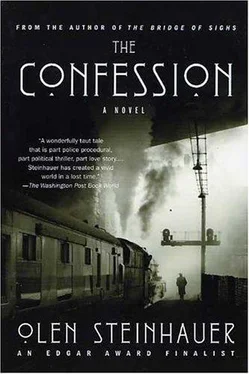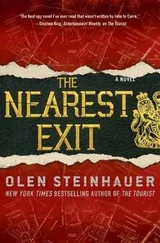Olen Steinhauer - The confession
Здесь есть возможность читать онлайн «Olen Steinhauer - The confession» весь текст электронной книги совершенно бесплатно (целиком полную версию без сокращений). В некоторых случаях можно слушать аудио, скачать через торрент в формате fb2 и присутствует краткое содержание. Жанр: Политический детектив, на английском языке. Описание произведения, (предисловие) а так же отзывы посетителей доступны на портале библиотеки ЛибКат.
- Название:The confession
- Автор:
- Жанр:
- Год:неизвестен
- ISBN:нет данных
- Рейтинг книги:5 / 5. Голосов: 1
-
Избранное:Добавить в избранное
- Отзывы:
-
Ваша оценка:
- 100
- 1
- 2
- 3
- 4
- 5
The confession: краткое содержание, описание и аннотация
Предлагаем к чтению аннотацию, описание, краткое содержание или предисловие (зависит от того, что написал сам автор книги «The confession»). Если вы не нашли необходимую информацию о книге — напишите в комментариях, мы постараемся отыскать её.
The confession — читать онлайн бесплатно полную книгу (весь текст) целиком
Ниже представлен текст книги, разбитый по страницам. Система сохранения места последней прочитанной страницы, позволяет с удобством читать онлайн бесплатно книгу «The confession», без необходимости каждый раз заново искать на чём Вы остановились. Поставьте закладку, и сможете в любой момент перейти на страницу, на которой закончили чтение.
Интервал:
Закладка:
“Georgi?”
“Nestor.”
He made a valiant attempt to hold my gaze, but the color rushed back into his glistening cheeks as he dropped his eyes to the bed-sheets. “I don’t know who that is, Ferenc.”
“Sure you do, Louis. He’s why you’ve come back here, isn’t he?”
Louis shrugged. “Nah. I’ve got to go to some Union meeting. International cooperation and all that.” But he was still staring at the sheets.
“Let me tell you a story,” I said.
Louis finally looked up, but at Leonek. He nodded in my direction. “ Writers. Always a story.”
Leonek nodded a polite agreement.
I got up and poured myself a vodka. “In this story, there is a brilliant painter. He’s ahead of his time, way ahead of his time. But no one knows this, because he’s also an eccentric. He doesn’t show his paintings to anyone, he doesn’t even sign the paintings. He’s that eccentric. Well, he is sent to a work camp. Happens to a lot of people. But after a while another painter-an untalented painter who can’t make any headway on his own-comes up with a brilliant idea. He takes those paintings, signs his own name, and gladly shows them off. He’s not so eccentric, just a little unethical. And this works. It works so well that his shows even travel into Western Europe-to Paris, even.”
“Paris?” said Louis, his fingers tapping his glass uncontrollably.
“This is bad luck for the unethical artist, because a very close friend of the jailed painter lives in Paris. He recognizes the work, and quickly deduces what happened. He decides that this artist sent his friend to the work camp, then stole his paintings. So what does he do?”
I watched Louis chew the inside of his mouth. But he did not speak.
“He returns here and goes to the work camp. He’s such a good friend that he even risks himself by bribing the camp commander to have a word with his friend. And there he tells his friend the story of his incarceration. Because, like anyone, this Parisian wants justice for his friend. And not only that, he wants to nurture the most glorious of human desires: revenge.”
Louis squeezed his eyes shut, as if they hurt. He remembered telling me this, and hated himself for the slip.
“Once the painter was amnestied from the work camp, the Parisian returned to the Capital to see him-that, by the way, is when I met the Parisian. I imagine he gave his friend the address of the art curator who had shown the stolen paintings-Josef Maneck.”
“No,” said Louis, shaking his head. “I gave him nothing.”
“Okay,” I said. “But either way, the artist began killing. Before killing the art curator, he got the address of the unethical artist out of him. Then he tracked down the unethical artist and tortured him. He broke his bones and dragged him into the Canal District, where he set the man on fire.”
Louis looked up at me.
“Then he killed the artist’s ex-wife, who had nothing to do with the crime in the first place.”
He blinked at his hands, which were scratching his knees through the pants. He didn’t seem to know about Zoia.
I sat on the bed again. “The Parisian’s heart was in the right place, at least generally so, but mistakes were made. The ex-wife, for one. She actually left Antonin Kullmann in disgust when she realized what had happened. And I’m not entirely convinced the curator knew about it at the beginning. I think he found out later, and the guilt turned him into an alcoholic-Antonin supported him to keep him quiet. But that’s the least of the Parisian’s mistakes. The biggest one is that, while Antonin Kullmann stole those paintings, he did not turn in Nestor Velcea. Someone else did.”
“What?” That was Leonek’s low voice by the door.
Louis stared at me, baffled. “That’s not true! It’s obvious.”
“It seems obvious,” I said. “I believed it, too. But before Nestor was sent away he witnessed the murder of a militiaman in 1946. And that’s a much more plausible reason to send someone to a work camp-to keep them quiet. The man who put Nestor away killed my partner a week and a half ago, and I think he tried to kill Nestor as well.”
“W-who?” said Louis.
“I don’t know.” I nodded at Leonek. “It’s the same person who killed Sergei Malevich, ten years ago. That person didn’t care about art, he only cared that Nestor Velcea had witnessed him shooting a militiaman on the banks of the Tisa. And as for Antonin, he was an untalented painter left with an apartment full of his roommate’s brilliant paintings. He only took advantage of another man’s tragedy.”
I let that settle in while I poured vodkas. I gave one to Leonek, who, red-faced, nodded at me. He was trying to comprehend what I had only begun to put together myself. The second vodka I gave to Louis. He took it without looking at me at all. The third I drank, feeling the burn slide down into my stomach. I was sure now of all I had said-it felt right. The act of speaking is like the act of writing; it makes ideas real. But only Nestor knew who had killed Sergei and Stefan.
“So, again,” I said. “Why have you returned to our country?”
Louis set his drink on the floor unfinished and mumbled something.
“What?”
“I brought Nestor’s papers. To get him out.”
“To France?”
He nodded.
“What did he tell you?”
“Just that he needed papers. It was a telegram.”
“And when are you meeting him?”
He looked at Leonek at the door, then at his hands.
“Come on, Louis. We’re the only ones who can keep him alive.”
“But you’ll put him in jail, won’t you?”
“I don’t know yet what we’ll do.”
Louis finally looked at me. “Day after tomorrow. Tuesday.”
79
It gave us forty-eight hours to watch Louis. Leonek took the first shift. He paid for another room one floor up and took Louis to it. The hotel staff would notice the broken door and window, but there would be no one left in that room to blame.
Before I left, Leonek pulled me aside, and whispered, “Let’s keep this between us for now.”
“We could call in Emil.”
“I trust him to be quiet, but he won’t keep it from Lena, and she doesn’t know how to keep her mouth shut. Then Brano Sev will know. Wasn’t he the one with Nestor’s file?”
I thought about that, but admitted that, despite everything, I still found it hard to believe that Brano Sev would kill Stefan.
“Believe it. That man has no friends.”
This was true. “But I also haven’t noticed any bullet wounds on him. Have you?”
Leonek shook his head. “Brano Sev is a machine.”
And I’d been wrong about plenty of things already.
At home I sat beside the radio set and considered giving Vera a call. The apartment was lonely without even her bleak company. But she hated me now.
So I drank in the empty apartment and wondered what Malik Woznica’s body looked like now, if it was covered or if the wind had blown the leaves off of him, exposing him to the elements. I closed my eyes.
The sound of the ringing telephone made me reach, instinctively, for my pistol. But I’d left it in the bedroom. I walked into the kitchen and picked up the receiver.
“Yes?”
“Ferenc?” My legs tingled. She was crying.
“What is it? What’s wrong?”
“What happened to Leonek?”
“Nothing. Why?”
“I tried to call him all day.”
“He’s fine. He’s working.”
“I have to speak with him.”
“I’m not going to be your liaison, Magda.”
“You don’t understand.”
“What don’t I understand?”
“I was calling him to end it. I can’t believe what I’ve done to you.”
I let that hang between us.
Читать дальшеИнтервал:
Закладка:
Похожие книги на «The confession»
Представляем Вашему вниманию похожие книги на «The confession» списком для выбора. Мы отобрали схожую по названию и смыслу литературу в надежде предоставить читателям больше вариантов отыскать новые, интересные, ещё непрочитанные произведения.
Обсуждение, отзывы о книге «The confession» и просто собственные мнения читателей. Оставьте ваши комментарии, напишите, что Вы думаете о произведении, его смысле или главных героях. Укажите что конкретно понравилось, а что нет, и почему Вы так считаете.












